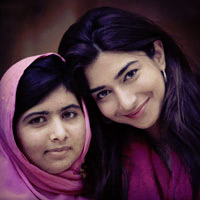Malala Yousafzai was a 15 year old advocating for education for girls when she was shot by the Taliban. Despite being attacked in such a brutal way by these terrorists, she continued her campaign for education. However she was still so young and didn’t know the world of business and didn’t quite know how to run such a program, so 24-year-old Shiza Shahid stepped in as her business partner and mentor and founded the Malala Fund. Shahid was born in the capital of Pakistan, Islamabad, and from a young age shared the same passion for education especially in regards to women. When she was a teenager, she spent her time helping children born to women in prison and volunteered at a relief camp. When she was 18 years old she received a scholarship to Stanford University and moved to California to further her education. Never forgetting her home country, she kept up with the education system in Pakistan and women’s rights over there. While she was in college, the Taliban took over Pakistan and bombed over 2,000 schools for girls, putting a ban on education for girls. Hearing Malala’s story and finding out she was shot, she flew over to the hospital in England where she was transferred and was there for her ever since. With her background, experience, and education, Shahid knew how to set up a scholarship fund for girls in need seeking to learn. She utilized the celebrity and media attention brought in by Malala’s story and turned it into a business to actually help girls in Pakistan. Through the Malala Fund, Shahid has raised over $400K. The fund has three goals: storytelling, public support, and supporting entrepreneurs in regions where girls don’t have access to education. With her passion for business, education, and charity, Shiza Shahid is a millenial entrepreneur worthy of notice.

Categories : Uncategorized
Comments
millennialentrepreneurs.com
Copyright © 2025 All Rights Reserved
Copyright © 2025 All Rights Reserved

Sarah, I loved reading this post. It is unfathomable what kinds of ways women are treated overseas, especially in countries like Pakistan. It is heartening to see a woman like Malala who is willing to do something that for her, is not very culturally accepted, in the name of making life for women in the Middle East better. I hope that I see more stories like hers.